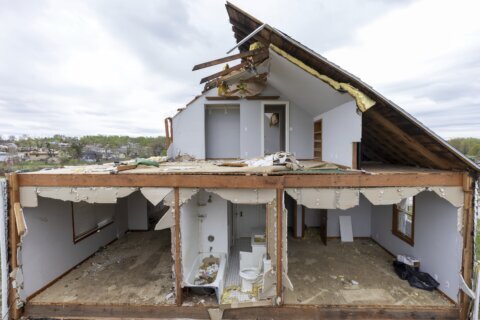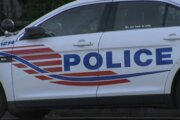NEW YORK (AP) — Donald Trump’s lawyers rested his defense Tuesday and sought anew to immediately end the New York civil fraud trial that threatens the former president’s real estate empire. The judge said “there’s no way I’m going to grant that.”
Trump’s lawyers — thwarted in a similar bid last month — were swatted down as they asked Judge Arthur Engoron to cut the trial short and issue a verdict clearing Trump, his company and top executives of wrongdoing. The judge reiterated his feeling that state lawyers had met their legal burden for seeing the three-month trial through to its conclusion.
New York Attorney General Letitia James alleges Trump duped banks, insurers and others by inflating his wealth on financial statements used in securing loans and make deals. Engoron has already ruled on James’ top claim that Trump committed fraud.
Trump’s lawyers renewed their request for what’s known as a directed verdict a day after Trump, the leading contender for the 2024 Republican presidential nomination, skipped a planned return to the witness stand as the defense’s last big witness.
Trump lawyer Christopher Kise said the defense plans to send Engoron paperwork by the end of the week fully detailing arguments for a directed verdict.
“You’d be wasting your time, but I’m not going to tell you not to send me something,” Engoron told Kise. But, he warned, “It doesn’t mean I’ll entertain” or even read the written request.
State lawyer Kevin Wallace complained the long-shot bid — essentially an academic exercise given Engoron’s position on the matter — was a “colossal waste of resources.”
Closing arguments are scheduled for Jan. 11, just four days before the Iowa caucuses start the presidential primary season. Engoron, who is deciding the case in place of a jury, which is not allowed in this type of lawsuit, said he hopes to have a decision by the end of January.
Trump’s lawyers first asked for a directed verdict on Nov. 9 after state lawyers rested their case. Engoron said he was taking the request “under advisement” and ordered the trial to proceed as scheduled.
A few weeks later, Engoron rejected the defense’s request for a mistrial, denying its claims that he was politically biased and had irreparably harmed Trump’s right to a fair trial through “astonishing departures from ordinary standards of impartiality.”
Trump’s lawyers moved again on Tuesday to short-circuit the trial after finishing with their final witness — an accounting expert whom Trump lauded after he testified he found no evidence of accounting fraud in Trump’s financial statements. State lawyers later started calling rebuttal witnesses. Testimony is expected to wrap Wednesday.
The state’s case involved six weeks of testimony from about two-dozen witnesses, including Trump, his eldest sons Eric and Donald Jr., daughter Ivanka, outside accountants and Trump Organization executives.
The defense then called witnesses over the course of about five weeks. They included real estate developers and brokers, a former federal financial regulator and accounting gurus.
Donald Trump Jr. also returned to the witness stand, this time to present “The Trump Story,” a slideshow of golf course fairways, skyscrapers and gilded interiors. He hailed his father as a real estate visionary while making no mention of his casino bankruptcies or other ventures that fizzled or drew regulatory scrutiny.
The defense rested after New York University accounting professor Eli Bartov’s third and final day of testimony. Bartov has blasted the state’s case and said Trump’s financial statements “were not materially misstated.”
In cross-examining Bartov, state lawyer Louis Solomon sought to undermine the contention that major Trump lender Deutsche Bank didn’t rely on his financial statements. Bartov emphasized earlier in his testimony that the bank often reduced the values Trump provided, and the professor had concluded such cuts were not merely “mechanical” but the results of bankers’ own analysis.
Solomon noted that retired Deutsche Bank executive Nicholas Haigh had testified that he believed such cuts were “standardized” for client-reported commercial real estate values.
“There’s no contradiction at all between those two statements,” Bartov said. He opined that the bank would have scrutinized enough of Trump’s assets to be satisfied he had the wherewithal to warrant the loan, and then, to save staff work but still be conservative, bankers would have applied a standard deduction to the remaining holdings.
Later, Solomon asked about a Trump Organization calculation that set the net operating income for a Wall Street office building at about four times the number that appraisers listed. If the Trump Organization’s number was inflated, he asked, wouldn’t the bank’s adjustment also be too high?
“I don’t agree with your premise,” said Bartov, later explaining that appraisers and the company used different methods for the income calculation.
In an unusual turn, Solomon also pointed to one of his colleagues’ defeats in another high-profile case to try to cast doubt on Bartov’s views.
In the same courthouse, Bartov once testified as an expert witness for the attorney general’s office in its lawsuit accusing Exxon Mobil of duping investors about the toll that climate change regulations could take on its business. Exxon won that case, and Judge Barry Ostrager’s ruling shrugged off the professor’s testimony as “unpersuasive” and “flatly contradicted by the weight of the evidence.”
Trump attorney Christopher Kise objected that the Exxon episode was irrelevant.
Copyright © 2024 The Associated Press. All rights reserved. This material may not be published, broadcast, written or redistributed.






